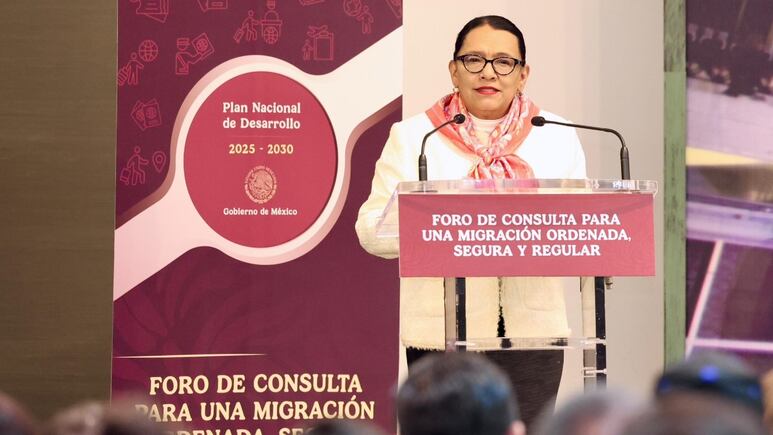Mexico will seek coordination with Trump, not extreme actions, to address migration issues
“We cannot stop being neighbors, cooperation is necessary”: Rosa Icela Rodríguez A new migration law and the comprehensive restructuring of the National Institute of Migration (INM) are among the points to be discussed at the Forum for Orderly, Safe, and Regular Migration

The Secretary of the Interior of the Government of Mexico, Rosa Icela Rodríguez Velázquez, responsible for coordinating migration policy and the Mexican government’s response in this area during the beginning of Donald Trump’s second presidential term and his threats of mass deportations of compatriots in irregular migration status, assured that Mexico is open to dialogue with the incoming U.S. administration.
Publicidad
This phenomenon, she stated, must be addressed in a coordinated manner and not through extreme measures.
During the inauguration of the Forum for an Orderly, Safe, and Regular Migration, as part of the consultations being held for the final development of the 2025-2030 National Development Plan, Rodríguez Velázquez reiterated the words of the first female president, Claudia Sheinbaum Pardo: “Threats or tariffs are not the way to address migration or drug consumption in the United States.” Cooperation and mutual understanding are required, she added.
“We share a border of over 3,400 kilometers with the United States, which shapes our present and future migration situation; it is something we cannot change, and we cannot stop being neighbors. We know that facing the challenges of both nations requires cooperation because that is the only way to achieve better results,” she affirmed.
Publicidad
Such is the case with the humanistic migration policy implemented by the Mexican government, which has led to a 76% reduction in irregular crossings over the past year.
Publicidad
She reported that in the last six years, our international transit points have processed just over 208 million regular entry events for nationals and foreigners, of which 1.3 million involved Mexicans returning from the U.S.
The public official reiterated that Mexico is of great significance in this matter as the country embodies the four dimensions of migration: origin, transit, destination, and return.
In the presence of Dana Graber, Head of Mission for the International Organization for Migration in Mexico, and Giovanni Lepri, Mexico representative for the United Nations High Commissioner for Refugees, who attended the Forum, the Secretary emphasized that Mexico is prepared to face potential scenarios in the new bilateral relationship, always prioritizing the welfare of Mexican nationals.
She recalled that Mexico has one of the largest migrant diasporas in the world. As of 2022, there were 38.8 million people of Mexican origin in the U.S., of which approximately 5.1 million were in irregular status.
She asserted that the Mexican government is ready to support them and will allocate whatever is necessary for the defense of its nationals.
“We are confident that the contributions from the participants in this forum will be highly significant, providing us with a broader and more comprehensive understanding of human mobility, which will translate into the strengthening of the National Development Plan and the creation of public policies and actions in migration matters,” Rodríguez Velázquez concluded.
Restructuring the National Institute of Migration
During his speech, the head of the National Institute of Migration (INM), Francisco Garduño, pointed out that this Forum should serve to bring to the table three fundamental points that experts and stakeholders in the field consistently demand:
- A new migration law
- A comprehensive restructuring of the National Institute of Migration
- A redesign of migration assistance policies
No migrant left on the streets, promises Mexico City mayor
Meanwhile, Mexico City Mayor Clara Brugada assured that her administration is working to ensure that by March, all migrants who have arrived in the city and are currently on the streets will have access to decent shelters and a range of rights.
“We aim to ensure that no person in mobility is forced to occupy a place on the streets while pursuing their goals.”
Her administration seeks to facilitate labor inclusion, access to healthcare, and education, focusing on children, women, and older people.
“Our commitment to people in human mobility is a commitment to social justice, and as a society, we are responsible for providing support and opportunities for those who arrive in our country and our city.
“Those who advocate isolation as a policy condemn themselves to failure as a nation. From Mexico, we reaffirm human mobility as a human right.”
Migration, she concluded, is an issue that can be addressed with justice.
Publicidad
Publicidad
Más Leídas | Heraldo USA
Robert Prevost, el nuevo papa León XIV: por qué eligió ese nombre y su significado
Por Heraldo USA
“Será un cónclave rápido”: Mhoni Vidente revela quién será el nuevo Papa
Por Heraldo USA
Cónclave 2025: ¿Quién es Robert Prevost, el nuevo Papa de la Iglesia Católica elegido hoy jueves 8 de mayo?
Por Heraldo USA
¿Qué significa la frase “habemus papam” y cuál es su origen?
Por Heraldo USA
Publicidad
Más noticias de México
Más noticias de Migración











